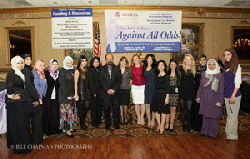DEARBORN — The Arab Community Center for Economic and Social Services (ACCESS) hosted their 7th Annual Domestic Violence Prevention “Against All Odds” Gala last Friday at the Bint Jebail Cultural Center in hopes of continued support for one of their most prominent programs. Domestic violence was the focus of the evening, with many guests sharing stories of struggles and aspiration regarding a topic mostly considered taboo in the community.
ACCESS’s Domestic Violence Prevention Program oversees around 300-350 cases a year involving women and children who are victims of some form of domestic violence, whether it’s physical, mental, or emotional, according to Mona Farroukh, the supervisor of the program. Attendees at the dinner included many community members who were victims that sought help through the program’s resources. All proceeds from the dinner went directly to the program’s funding.
“One in four children are exposed to some form of family violence in their lifetime and without intervention, those children are at higher risk for school failure, substance abuse, repeat victimization and committing violence later in their lives. We must start at the beginning before we end up with tragedies like the Sandy Hook Elementary shooting,” Farroukh told the crowd.
Founder of Zaman International, Najah Bazzy, was also a speaker at the event. Bazzy recalled a story of witnessing a mother abusing her children in public while everyone around her had decided to ignore it. She says a recurring problem nationwide is when people sit by and don’t take action when witnessing others being abused. Bazzy stated that ACCESS’s DVP program is important for those individuals who no longer have anywhere to turn. The program offers therapists, psychiatrists, lawyers, and a case manager free at cost for women or families who turn to them for help.
“There is an obligation before God to be a voice for the voiceless…we have to do this because the only way we can have a safe home, a safe neighborhood, a safe community, a safe nation, and a safe world, is to be able to hold whoever the victim of violence is…not when you tell them to go somewhere else for a referral, when they are already shattered and broken. You hold them, you take care of them, you put the resources around them and you give them a fighting chance,” Bazzy stated.

One noteworthy speaker at the event was Author Mildred Muhammad, who shared her personal story of domestic violence in her book “Scared Silent.” Mildred was married to John Allen Muhammad, who was responsible for the sniper attacks of 2002 that took place in Washington D.C, Maryland and Virginia, killing ten people. Mildred says her husband had orchestrated the attacks as part of a bigger plot to kill her and take their two daughters, so that it would appear she was killed randomly by a sniper who would have already killed numerous people leading up to her death. She urged women to seek help for the sake of their children, drawing from personal experience of how her mental state of health also took a toll on her daughters.
After the dinner we spoke to ACCESS Senior Director Dr. Adnan Hammad, who said despite the organization’s efforts to help hundreds of people a year, there is still a large percentage of the community who battle domestic violence on daily basis, and they don’t seek help because they feel ashamed.
“There is a very concealed taboo and stigma related to domestic violence and abuse in the Arab American community and we still view this problem as a family internal issue. In the mainstream communities, when it happens it is usually uncovered, published and there is no shame element attached. Unfortunately in our community the shame, ridicule and stigma factors are really surrounded with domestic violence,” Dr. Hammad stated.
Reccurring violence against women and children in the Arab American community continues to be viewed as a form of discipline by some men, that’s loosely based on a way of culture according to Hammad. Dr. Hammad says sometimes disciplining children using abuse can be crossing the line, and many times men will think it’s okay to do the same thing to their wives. With caucasian families, domestic violence is more likely to stem from abusing substances or alcohol, but for smaller ethnic groups like Arab Americans, domestic violence can stem from immigration and acculturation stress. Economic factors such as poor income and social problems among immigrant males can lead to domestic violence in the family.
Dr. Hammad says many women and families in the community that do seek help end up going to the wrong resources. Some women seek comfort by speaking to a religious leader, but Dr. Hammad believes the problems can not be solved from just one conversation.
“I would like to send a very strong message to our community, religious leader, law enforcers and families. Whenever there is a domestic violence issue, they need to refer these cases to ACCESS because this is where the professionals can have the opportunity to heal these victims. You can talk to an Imam forever, but an Imam is not a therapist and he is not a counselor. He can do his part, but he should be able to know that he needs to refer this case back to us. They can not treat the emotional symptoms on a victim because this is where our professional staff intervenes. Only when these individuals heal, their families heal and society heals,” Dr. Hammad stated.
Dr. Hammad says many of these women who have gone through their program have been able to get back on their feet within months. He encourages women, children and families to contact ACCESS if they continue to suffer from a form of domestic violence in their home. For more information, call 313.216.2200.






Leave a Reply